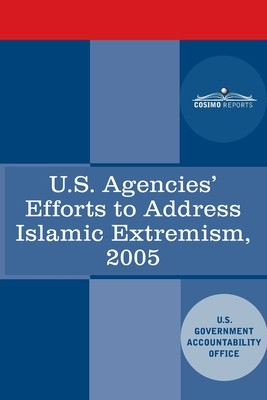
- We will send in 10–14 business days.
- Author: Government Accountability Office
- Publisher: COSIMO REPORTS
- ISBN-10: 1646790103
- ISBN-13: 9781646790104
- Format: 15.2 x 22.9 x 0.2 cm, minkšti viršeliai
- Language: English
- SAVE -10% with code: EXTRA
U.S. Agencies' Efforts to Address Islamic Extremism (e-book) (used book) | bookbook.eu
Reviews
Description
"It is far from clear that Al Qaida or ISIS can ever be fully defeated. The ISIS 'caliphate' may be largely broken up, but substantial elements of both movements remain. New movements may emerge... and the demographic trends of Muslim-majority countries are a powerful warning that extremism may be a threat for decades to come." --Anthony H. Cordesman, Arleigh Burke Chair in Strategy at the Center for Strategic & International Studies, January 2019
Although US Agencies' Efforts to Address Islamic Extremism was published in 2005 by the U.S. Government Accountability Office, it offers a clear context about the dangers of Islamic extremism since the beginning of this century.
Even then, some US officials and experts believed that Islamic extremism, rather than Al Qaeda--the organization responsible for the attacks on the United States on September 11, 2001--was the pre-eminent threat to US interests.
The rise in Islamic extremism stemmed from various factors, including:
- economic stagnation;
- a disproportionate concentration of the Middle Eastern population in the 15- to 29-year-old range ("youth bulges");
- repressive and corrupt governments; and
- anti-Western sentiments, particularly due to negative perceptions of the United States' foreign policy.
It is worrisome that at the end of the second decade of the 21st century, Islamic extremism remains a threat, as the above recent quote by Anthony Cordesman shows.
Students of Islamic extremism, journalists, politicians, and anyone interested in the most important US foreign policy challenge at the beginning of the 21st century, will find this vital background reading.
- Author: Government Accountability Office
- Publisher: COSIMO REPORTS
- ISBN-10: 1646790103
- ISBN-13: 9781646790104
- Format: 15.2 x 22.9 x 0.2 cm, minkšti viršeliai
- Language: English English
"It is far from clear that Al Qaida or ISIS can ever be fully defeated. The ISIS 'caliphate' may be largely broken up, but substantial elements of both movements remain. New movements may emerge... and the demographic trends of Muslim-majority countries are a powerful warning that extremism may be a threat for decades to come." --Anthony H. Cordesman, Arleigh Burke Chair in Strategy at the Center for Strategic & International Studies, January 2019
Although US Agencies' Efforts to Address Islamic Extremism was published in 2005 by the U.S. Government Accountability Office, it offers a clear context about the dangers of Islamic extremism since the beginning of this century.
Even then, some US officials and experts believed that Islamic extremism, rather than Al Qaeda--the organization responsible for the attacks on the United States on September 11, 2001--was the pre-eminent threat to US interests.
The rise in Islamic extremism stemmed from various factors, including:
- economic stagnation;
- a disproportionate concentration of the Middle Eastern population in the 15- to 29-year-old range ("youth bulges");
- repressive and corrupt governments; and
- anti-Western sentiments, particularly due to negative perceptions of the United States' foreign policy.
It is worrisome that at the end of the second decade of the 21st century, Islamic extremism remains a threat, as the above recent quote by Anthony Cordesman shows.
Students of Islamic extremism, journalists, politicians, and anyone interested in the most important US foreign policy challenge at the beginning of the 21st century, will find this vital background reading.


Reviews